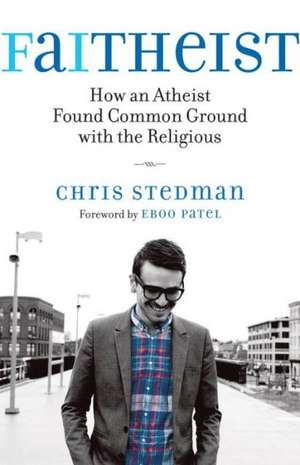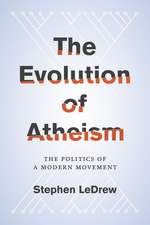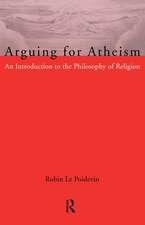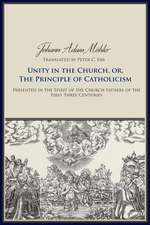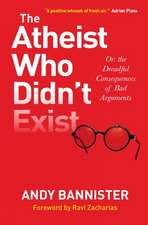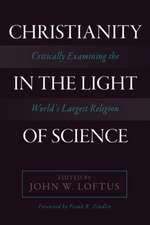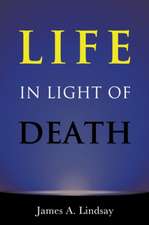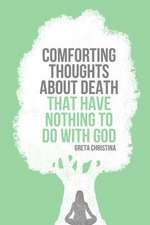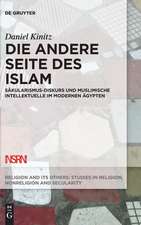Faitheist
Autor Chris Stedmanen Limba Engleză Paperback – 28 oct 2013
The stunning popularity of the “New Atheist” movement—whose most famous spokesmen include Richard Dawkins, Sam Harris, and the late Christopher Hitchens—speaks to both the growing ranks of atheists and the widespread, vehement disdain for religion among many of them. In Faitheist, Chris Stedman tells his own story to challenge the orthodoxies of this movement and make a passionate argument that atheists should engage religious diversity respectfully.
Becoming aware of injustice, and craving community, Stedman became a “born-again” Christian in late childhood. The idea of a community bound by God’s love—a love that was undeserved, unending, and guaranteed—captivated him. It was, he writes, a place to belong and a framework for making sense of suffering.
But Stedman’s religious community did not embody this idea of God’s love: they were staunchly homophobic at a time when he was slowly coming to realize that he was gay. The great suffering this caused him might have turned Stedman into a life-long New Atheist. But over time he came to know more open-minded Christians, and his interest in service work brought him into contact with people from a wide variety of religious backgrounds. His own religious beliefs might have fallen away, but his desire to change the world for the better remained. Disdain and hostility toward religion was holding him back from engaging in meaningful work with people of faith. And it was keeping him from full relationships with them—the kinds of relationships that break down intolerance and improve the world.
In Faitheist, Stedman draws on his work organizing interfaith and secular communities, his academic study of religion, and his own experiences to argue for the necessity of bridging the growing chasm between atheists and the religious. As someone who has stood on both sides of the divide, Stedman is uniquely positioned to present a way for atheists and the religious to find common ground and work together to make this world—the one world we can all agree on—a better place.
From the Hardcover edition.
| Toate formatele și edițiile | Preț | Express |
|---|---|---|
| Paperback (1) | 88.25 lei 3-5 săpt. | |
| Beacon Press (MA) – 28 oct 2013 | 88.25 lei 3-5 săpt. | |
| Hardback (1) | 132.60 lei 3-5 săpt. | +15.89 lei 4-10 zile |
| Beacon Press (MA) – 5 noi 2012 | 132.60 lei 3-5 săpt. | +15.89 lei 4-10 zile |
Preț: 88.25 lei
Nou
Puncte Express: 132
Preț estimativ în valută:
16.89€ • 17.57$ • 13.94£
16.89€ • 17.57$ • 13.94£
Carte disponibilă
Livrare economică 24 martie-07 aprilie
Preluare comenzi: 021 569.72.76
Specificații
ISBN-13: 9780807014455
ISBN-10: 0807014451
Pagini: 191
Dimensiuni: 142 x 216 x 18 mm
Greutate: 0.27 kg
Editura: Beacon Press (MA)
ISBN-10: 0807014451
Pagini: 191
Dimensiuni: 142 x 216 x 18 mm
Greutate: 0.27 kg
Editura: Beacon Press (MA)
Notă biografică
Chris Stedman is the Assistant Humanist Chaplain at Harvard University, the emeritus managing director of State of Formation at the Journal of Inter-Religious Dialogue, and the founder of the first blog dedicated to exploring atheist-interfaith engagement, NonProphet Status. Stedman writes for the Huffington Post, the Washington Post’s On Faith blog, and Religion Dispatches. He lives in Boston.
From the Hardcover edition.
From the Hardcover edition.
Extras
From Chapter 1
There’s Nothing Worse Than a Faitheist
The chief deficiency I see in the skeptical movement is its polarization:
Us vs. Them—the sense that we have a monopoly on the truth; that those other people who believe in all these stupid doctrines are morons; that if you’re sensible, you’ll listen to us; and if not, to hell with you. This is nonconstructive. It does not get our message across. It condemns us to permanent minority status.
—Carl Sagan
I had never heard the word “faitheist” before, but I was pretty sure it wasn’t a compliment.
I blushed and ran my hands through my short coffee-colored hair—a nervous habit—and cleared my throat, asking if it was intended to be an insult.
“Yes,” he said without inflection. “There’s nothing worse than a ‘faitheist.’”
It was my first experience with the atheist movement, and for at least a moment I thought it might be my last. I’d been an atheist for a while, but I had hesitated to seek out a community of nonreligious people. I imagined that secular folks would be difficult to organize; that assembling atheists, agnostics, skeptics, freethinkers, and other nonreligious individuals would prove tricky because our common thread—that we are not something—underscores only what we do not believe. But as I progressed in my work as an interfaith activist, I noticed that one of the things that actually made people good at it was a groundedness in one’s own identity. That, paired with my longing for a community of common belief, led me to begin searching for an organized community of nontheists.
The brusque brush-off occurred at a reception following a public discussion organized by a nonreligious group; the topic had been how the nonreligious—more specifically, atheists, agnostics, and other nontheistic, nonreligious people—should approach religion. I had suspected that there would be mixed feelings about religion. After all, I knew of the popular atheist discourse on the subject, which cast the religious not only as incorrect about metaphysical realities but as standing in the way of social and intellectual progress. But I had also hoped that someone might offer a more balanced perspective on religion, locating within the beliefs, desires, and actions of religious people similar values held by many nonreligious people.
I had gone with optimism and excitement. At the time, I was both an atheist and an intern for Interfaith Youth Core, an organization that helps mobilize young people to change the public narrative on religion from one of conflict to one of cooperation by engaging in dialogue around shared values and collaborative action. Because of my work, I felt I was in a particularly good position to discuss religion in the lives of nonreligious folks. I pictured myself saying with a well-meaning grin, “Hey, I work with religious people every day and my atheism is stronger than ever!” I hoped I might even serve as a bridge between two communities that are so oft en pitted against one another, to offer my insights as a nonreligious person working in an interfaith environment.
That aspiration was quickly curtailed. Throughout the program, religion—and religious people—were roundly mocked, decried, and denied. I’d arrived hoping to find a community bound by ethical and humanitarian ideals. Instead, I felt isolated and sorely discouraged.
Though I was disheartened by the event, I went to the post-panel reception, held at one of the panelists’ apartments, because I hoped that if I spoke with more of the group members I’d find some people who shared my opinions or learn a bit more about why they believed differently than I did. Also, as a thrift y graduate student, free dinner and drinks were hard to pass up!
I walked in and instantly removed my shoes. The apartment was beautiful; the ceiling-to-floor windows allowed for a stunning view of Chicago’s orange-and-white-lit skyline. The living room was impeccably clean. (I made a mental note to at least shove my dirty laundry in the closet when I got home.) I stood there and scanned the crowd; I was easily the youngest person there and unfashionably underdressed (nothing new there). Looking down at my feet, I noticed there was a hole in each of my socks. Maybe I should’ve left my shoes on, I thought.
I sat down on the couch, carefully balancing a mint julep in one hand and a plate of hors d’oeuvres I couldn’t name in the other, intensely aware of how out of place I must have seemed. Next to me on the couch were a woman in her mid-forties with a shimmering peacock brooch and a man in his late thirties wearing a denim shirt and a tan corduroy vest. I introduced myself and asked what they’d thought of the panel. They raved: “Wasn’t it wonderful how intelligent the panelists were and how wickedly they’d exposed the frauds of religion? Weren’t they right that we must all focus our energy on bringing about the demise of religious myths?”
I paused, debating whether I should say anything. My “Minnesota Nice” inclination warned me to let it be, but I had to say something. So I started small, asking them to consider that diversity of thought and background fosters an environment where discourse thrives, where ideas are exchanged, and where we learn from one another.
I was stonewalled: “We have the superior perspective; everyone else is lost,” said the woman with a flick of her hand that suggested she was swatting at an invisible mosquito.
As a former Evangelical Christian, these words were hauntingly familiar, and they represented a kind of sure-handed certainty and dismissal—a kind of fundamentalist thinking, really— that I’d hoped to leave behind with my “born again” beliefs.
Our conversation continued, and I offered up petitions that the positive contributions of religious people be considered with equal weight alongside the negative.
“I understand what you’re saying,” I said, trying to weigh my words carefully, “but how can we discount the role religious beliefs played in motivating the Reverend Dr. Martin Luther King Jr. or
Mahatma Gandhi?”
“Oh, I get it,” the man jumped in with a sneer. “You’re one of those atheists.”
I wasn’t sure what he meant, but it didn’t sound like a good thing. I shifted my weight from one side to another—another nervous habit—and picked at an hors d’oeuvre that I thought might be some kind of cheese.
“What do you mean, ‘one of those atheists’?”
“You’re not a real atheist. We’ve got a name for people like you. You’re a ‘faitheist.’”
Not a real atheist. I’d heard words like that before—in my youth, when I was told I couldn’t be a real Christian because I was gay. Once again I didn’t fit the prescribed model, and I was not-so-gently shown the door.
Now, atheism is a bit different from Christianity in that atheism isn’t a belief system. It’s an identification marker that unifies a minority of Americans who do not believe in God. But the implication was clear: you’re at the wrong party, kid.
The next day, I attended my weekly religion class at Loyola University’s Institute of Pastoral Studies, a Jesuit Catholicߝrun program for priests, nuns, and lay leaders. As the only self-identified nonreligious person in the class, I was regularly met with many questions. Once, a Catholic classmate cornered me in the elevator after class, proclaiming, “I’ve been dying to ask you about your atheism!” Yet it never felt like an affront—she and the others were genuinely (and understandably) curious.
Sitting in class the day after my botched attempt at seeking secular community, I realized that I felt more at home with my religious colleagues than with the atheists from the day before. I looked around the room, focusing on each individual face; here were people who believed in a God I had theorized away years ago, yet they felt more like kin than most atheists I knew. While my classmates felt that their religious beliefs were right, they not only tolerated my beliefs but also enthusiastically embraced and challenged them.
Even though many parts of the United States remain incredibly segregated, we live in the most religiously diverse nation on the planet, so one doesn’t need to be an atheist enrolled in a Catholic institution to know that many American citizens are by default required to coexist with people who believe radically different things. The question I found myself asking that day, however, went a step beyond that.
It was not, “Can religiously diverse people coexist in peace?”— because, with some notable exceptions, Americans generally manage to tolerate one another’s differences. It was, instead, “Can we learn to seek out our commonalities instead of solely fixating on our differences?” This idea that it is worthwhile to make an intentional effort to find common ground is, to me, the difference between mere diversity and engaged pluralism. It is a question that our nation—in which a solid majority of Americans associate the extremists of 9/11 with all Muslims—is not close to resolving.
The challenge of engaged religious diversity—of intersecting religious difference—is one that atheists know perhaps more intimately than most. In a nation full of believers of all stripes, we are, in a sense, outliers. This is perhaps why so many atheists today ask for equal airtime alongside our religious neighbors—we want to be taken seriously, to be seen as equally ethical individuals. The unfortunate side effect is that many atheists demand this at the expense of talking to our religious peers in a way that affords them dignity and respect.
Several years ago, Harvard Humanist chaplain Greg Epstein wrote a book called Good Without God, and his thesis was a simple but important one: our society must move beyond the question of if one can be good without God to how this may be accomplished.
I join Greg in wanting people to move beyond wondering whether I am a moral individual, but I also join him in a companion call to our own community: atheism must move beyond defining itself—both in thought and in practice—in opposition to religion. If secular Americans want to be respected in our religiously diverse culture, we need to recognize that there is nuance and complexity in the diversity that defines it.
Ralph Waldo Emerson, a forefather of modern Humanism, is often said to have written these lines: “That which dominates our imaginations and our thoughts will determine our lives and character. Therefore, it behooves us to be careful what we worship, for what we are worshiping we are becoming.”
There’s Nothing Worse Than a Faitheist
The chief deficiency I see in the skeptical movement is its polarization:
Us vs. Them—the sense that we have a monopoly on the truth; that those other people who believe in all these stupid doctrines are morons; that if you’re sensible, you’ll listen to us; and if not, to hell with you. This is nonconstructive. It does not get our message across. It condemns us to permanent minority status.
—Carl Sagan
I had never heard the word “faitheist” before, but I was pretty sure it wasn’t a compliment.
I blushed and ran my hands through my short coffee-colored hair—a nervous habit—and cleared my throat, asking if it was intended to be an insult.
“Yes,” he said without inflection. “There’s nothing worse than a ‘faitheist.’”
It was my first experience with the atheist movement, and for at least a moment I thought it might be my last. I’d been an atheist for a while, but I had hesitated to seek out a community of nonreligious people. I imagined that secular folks would be difficult to organize; that assembling atheists, agnostics, skeptics, freethinkers, and other nonreligious individuals would prove tricky because our common thread—that we are not something—underscores only what we do not believe. But as I progressed in my work as an interfaith activist, I noticed that one of the things that actually made people good at it was a groundedness in one’s own identity. That, paired with my longing for a community of common belief, led me to begin searching for an organized community of nontheists.
The brusque brush-off occurred at a reception following a public discussion organized by a nonreligious group; the topic had been how the nonreligious—more specifically, atheists, agnostics, and other nontheistic, nonreligious people—should approach religion. I had suspected that there would be mixed feelings about religion. After all, I knew of the popular atheist discourse on the subject, which cast the religious not only as incorrect about metaphysical realities but as standing in the way of social and intellectual progress. But I had also hoped that someone might offer a more balanced perspective on religion, locating within the beliefs, desires, and actions of religious people similar values held by many nonreligious people.
I had gone with optimism and excitement. At the time, I was both an atheist and an intern for Interfaith Youth Core, an organization that helps mobilize young people to change the public narrative on religion from one of conflict to one of cooperation by engaging in dialogue around shared values and collaborative action. Because of my work, I felt I was in a particularly good position to discuss religion in the lives of nonreligious folks. I pictured myself saying with a well-meaning grin, “Hey, I work with religious people every day and my atheism is stronger than ever!” I hoped I might even serve as a bridge between two communities that are so oft en pitted against one another, to offer my insights as a nonreligious person working in an interfaith environment.
That aspiration was quickly curtailed. Throughout the program, religion—and religious people—were roundly mocked, decried, and denied. I’d arrived hoping to find a community bound by ethical and humanitarian ideals. Instead, I felt isolated and sorely discouraged.
Though I was disheartened by the event, I went to the post-panel reception, held at one of the panelists’ apartments, because I hoped that if I spoke with more of the group members I’d find some people who shared my opinions or learn a bit more about why they believed differently than I did. Also, as a thrift y graduate student, free dinner and drinks were hard to pass up!
I walked in and instantly removed my shoes. The apartment was beautiful; the ceiling-to-floor windows allowed for a stunning view of Chicago’s orange-and-white-lit skyline. The living room was impeccably clean. (I made a mental note to at least shove my dirty laundry in the closet when I got home.) I stood there and scanned the crowd; I was easily the youngest person there and unfashionably underdressed (nothing new there). Looking down at my feet, I noticed there was a hole in each of my socks. Maybe I should’ve left my shoes on, I thought.
I sat down on the couch, carefully balancing a mint julep in one hand and a plate of hors d’oeuvres I couldn’t name in the other, intensely aware of how out of place I must have seemed. Next to me on the couch were a woman in her mid-forties with a shimmering peacock brooch and a man in his late thirties wearing a denim shirt and a tan corduroy vest. I introduced myself and asked what they’d thought of the panel. They raved: “Wasn’t it wonderful how intelligent the panelists were and how wickedly they’d exposed the frauds of religion? Weren’t they right that we must all focus our energy on bringing about the demise of religious myths?”
I paused, debating whether I should say anything. My “Minnesota Nice” inclination warned me to let it be, but I had to say something. So I started small, asking them to consider that diversity of thought and background fosters an environment where discourse thrives, where ideas are exchanged, and where we learn from one another.
I was stonewalled: “We have the superior perspective; everyone else is lost,” said the woman with a flick of her hand that suggested she was swatting at an invisible mosquito.
As a former Evangelical Christian, these words were hauntingly familiar, and they represented a kind of sure-handed certainty and dismissal—a kind of fundamentalist thinking, really— that I’d hoped to leave behind with my “born again” beliefs.
Our conversation continued, and I offered up petitions that the positive contributions of religious people be considered with equal weight alongside the negative.
“I understand what you’re saying,” I said, trying to weigh my words carefully, “but how can we discount the role religious beliefs played in motivating the Reverend Dr. Martin Luther King Jr. or
Mahatma Gandhi?”
“Oh, I get it,” the man jumped in with a sneer. “You’re one of those atheists.”
I wasn’t sure what he meant, but it didn’t sound like a good thing. I shifted my weight from one side to another—another nervous habit—and picked at an hors d’oeuvre that I thought might be some kind of cheese.
“What do you mean, ‘one of those atheists’?”
“You’re not a real atheist. We’ve got a name for people like you. You’re a ‘faitheist.’”
Not a real atheist. I’d heard words like that before—in my youth, when I was told I couldn’t be a real Christian because I was gay. Once again I didn’t fit the prescribed model, and I was not-so-gently shown the door.
Now, atheism is a bit different from Christianity in that atheism isn’t a belief system. It’s an identification marker that unifies a minority of Americans who do not believe in God. But the implication was clear: you’re at the wrong party, kid.
The next day, I attended my weekly religion class at Loyola University’s Institute of Pastoral Studies, a Jesuit Catholicߝrun program for priests, nuns, and lay leaders. As the only self-identified nonreligious person in the class, I was regularly met with many questions. Once, a Catholic classmate cornered me in the elevator after class, proclaiming, “I’ve been dying to ask you about your atheism!” Yet it never felt like an affront—she and the others were genuinely (and understandably) curious.
Sitting in class the day after my botched attempt at seeking secular community, I realized that I felt more at home with my religious colleagues than with the atheists from the day before. I looked around the room, focusing on each individual face; here were people who believed in a God I had theorized away years ago, yet they felt more like kin than most atheists I knew. While my classmates felt that their religious beliefs were right, they not only tolerated my beliefs but also enthusiastically embraced and challenged them.
Even though many parts of the United States remain incredibly segregated, we live in the most religiously diverse nation on the planet, so one doesn’t need to be an atheist enrolled in a Catholic institution to know that many American citizens are by default required to coexist with people who believe radically different things. The question I found myself asking that day, however, went a step beyond that.
It was not, “Can religiously diverse people coexist in peace?”— because, with some notable exceptions, Americans generally manage to tolerate one another’s differences. It was, instead, “Can we learn to seek out our commonalities instead of solely fixating on our differences?” This idea that it is worthwhile to make an intentional effort to find common ground is, to me, the difference between mere diversity and engaged pluralism. It is a question that our nation—in which a solid majority of Americans associate the extremists of 9/11 with all Muslims—is not close to resolving.
The challenge of engaged religious diversity—of intersecting religious difference—is one that atheists know perhaps more intimately than most. In a nation full of believers of all stripes, we are, in a sense, outliers. This is perhaps why so many atheists today ask for equal airtime alongside our religious neighbors—we want to be taken seriously, to be seen as equally ethical individuals. The unfortunate side effect is that many atheists demand this at the expense of talking to our religious peers in a way that affords them dignity and respect.
Several years ago, Harvard Humanist chaplain Greg Epstein wrote a book called Good Without God, and his thesis was a simple but important one: our society must move beyond the question of if one can be good without God to how this may be accomplished.
I join Greg in wanting people to move beyond wondering whether I am a moral individual, but I also join him in a companion call to our own community: atheism must move beyond defining itself—both in thought and in practice—in opposition to religion. If secular Americans want to be respected in our religiously diverse culture, we need to recognize that there is nuance and complexity in the diversity that defines it.
Ralph Waldo Emerson, a forefather of modern Humanism, is often said to have written these lines: “That which dominates our imaginations and our thoughts will determine our lives and character. Therefore, it behooves us to be careful what we worship, for what we are worshiping we are becoming.”
Recenzii
“Christians like me have heard lots of ‘testimonies’—how I once was lost but now am found, was blind ... and so on. We've heard how atheists converted to Christianity, how backsliders came back to piety, and how heretics returned to orthodoxy. What we haven’t heard enough of is testimonies about how a Christian became an atheist or how an atheist became a faitheist or how a gay Evangelical came out of the closet and out of the church. I’ve never read, heard, or met anyone better suited to this task than Chris Stedman. His beautiful writing voice, his poignant story-telling skill, his clear-eyed insight, his humane and humble empathy uniquely equip him to bear witness to everyone—especially Christians like me. Rigid anti-theists and theists alike will be challenged as they read—challenged to greater humanity, empathy, and understanding. Wholeheartedly recommended.”—Brian D. McLaren, author of Why Did Jesus, Moses, the Buddha, and Mohammed Cross the Road?
“Smart. Funny. Heartening. Inspiring. Faitheist is the perfect book for those seeking a middle path between the firm, opposing certainties of religious fundamentalism and intolerant atheism.”—Reza Aslan, author of No god but God and Beyond Fundamentalism
“If Chris Stedman had become a pastor, he’d have a big, big church. Instead, he’s a humanist hero, a compelling writer whose efforts to build bridges between non-believers and the faithful will leave a lasting mark. Faitheist should be required reading in Sunday schools and Richard Dawkins’s house alike.” —Kevin Roose, author of The Unlikely Disciple
“Agree or disagree with Chris Stedman (and there will be many who do both), no one can deny that he has written a deeply human book—human in its description of his own pilgrimage and human in its call to theists and non-theists alike to seek out common ground. The world would be a better place with more Chris Stedman’s in it and fortunately he has provided us a roadmap to just such a world.”—The Rev. William F. Schulz, President, Unitarian Universalist Service Committee
“Who can we be together? Chris Stedman asks in this powerful book. Faitheist reveals that it’s not what we believe that matters, but how our beliefs shape what we do with our lives—a timely reminder for both atheists and the religious that the goal should be neither conversion nor the destruction of religion, but rather to make a better world.”—Sarah Sentilles, author of Breaking Up with God: A Love Story
“Stedman the atheist pays God the ultimate compliment: He provides a vigorous, amusing dissent to the all-too-glib magical ‘thinking’ both most Americanized big time religion and most so-called New Atheists are selling. Unlike the New Atheist stars and America's blathering religious fundamentalists Stedman lays the groundwork for constructive engagement between all of us—no matter what we believe...or don't.”—Frank Schaeffer, author of Crazy For God
“Chris Stedman’s remarkable work has spanned from advocating for LGBTQ rights among Evangelical Christians to, in his current role at Harvard, founding the first-ever atheist-led interfaith initiative -- and he's only twenty-five. Part memoir and part blueprint, Faitheist not only recounts his personal journey (which would be a riveting story on its own), but also shows -- sensitively and humorously -- how Humanists can live out our values with both empathy and honesty. This book represents the growing secular movement at its very best.” —Greg M. Epstein, Humanist Chaplain at Harvard University, author of Good Without God: What a Billion Nonreligious People Do Believe
“The searching, intelligent account of a gay man's experiences growing away from God and into a thoughtful and humane atheist… Brave and refreshingly open-minded.”—Kirkus Reviews
“Enter Stedman, avowed atheist, former Fundamentalist Christian, and current interfaith activist whose heartfelt and thought-provoking account of his struggle with God and religion serves as a call to arms for those seeking to bridge the gap between the religious and the secular… To that end he paints an intimate and deeply affecting portrait of his own life, one characterized by the sort of staggering dissonances—gay Christian teen, religion-degree-seeking atheist—that could cripple a person. But Stedman is nothing if not determined, and his resulting journey toward personal reconciliation through service work and interfaith dialogue is inspiring. Stedman’s story is motivational, his thoughts on interreligious dialogue insightful, and in this short memoir, he proves himself an activist in the truest sense and one to watch.”
—Booklist, Starred Review
"Faitheist, a new memori by local author Chris Stedman, promotes a warm, loving, and witty serving of intercultural dialogue."—Scott Kearnan, Boston Spirit
“An enlightening and engaging memoir.”
—Minneapolis Star Tribune
"His book about being religious and being secular, together, offers his hope for a better world"
—Toledo Blade
From the Hardcover edition.
“Smart. Funny. Heartening. Inspiring. Faitheist is the perfect book for those seeking a middle path between the firm, opposing certainties of religious fundamentalism and intolerant atheism.”—Reza Aslan, author of No god but God and Beyond Fundamentalism
“If Chris Stedman had become a pastor, he’d have a big, big church. Instead, he’s a humanist hero, a compelling writer whose efforts to build bridges between non-believers and the faithful will leave a lasting mark. Faitheist should be required reading in Sunday schools and Richard Dawkins’s house alike.” —Kevin Roose, author of The Unlikely Disciple
“Agree or disagree with Chris Stedman (and there will be many who do both), no one can deny that he has written a deeply human book—human in its description of his own pilgrimage and human in its call to theists and non-theists alike to seek out common ground. The world would be a better place with more Chris Stedman’s in it and fortunately he has provided us a roadmap to just such a world.”—The Rev. William F. Schulz, President, Unitarian Universalist Service Committee
“Who can we be together? Chris Stedman asks in this powerful book. Faitheist reveals that it’s not what we believe that matters, but how our beliefs shape what we do with our lives—a timely reminder for both atheists and the religious that the goal should be neither conversion nor the destruction of religion, but rather to make a better world.”—Sarah Sentilles, author of Breaking Up with God: A Love Story
“Stedman the atheist pays God the ultimate compliment: He provides a vigorous, amusing dissent to the all-too-glib magical ‘thinking’ both most Americanized big time religion and most so-called New Atheists are selling. Unlike the New Atheist stars and America's blathering religious fundamentalists Stedman lays the groundwork for constructive engagement between all of us—no matter what we believe...or don't.”—Frank Schaeffer, author of Crazy For God
“Chris Stedman’s remarkable work has spanned from advocating for LGBTQ rights among Evangelical Christians to, in his current role at Harvard, founding the first-ever atheist-led interfaith initiative -- and he's only twenty-five. Part memoir and part blueprint, Faitheist not only recounts his personal journey (which would be a riveting story on its own), but also shows -- sensitively and humorously -- how Humanists can live out our values with both empathy and honesty. This book represents the growing secular movement at its very best.” —Greg M. Epstein, Humanist Chaplain at Harvard University, author of Good Without God: What a Billion Nonreligious People Do Believe
“The searching, intelligent account of a gay man's experiences growing away from God and into a thoughtful and humane atheist… Brave and refreshingly open-minded.”—Kirkus Reviews
“Enter Stedman, avowed atheist, former Fundamentalist Christian, and current interfaith activist whose heartfelt and thought-provoking account of his struggle with God and religion serves as a call to arms for those seeking to bridge the gap between the religious and the secular… To that end he paints an intimate and deeply affecting portrait of his own life, one characterized by the sort of staggering dissonances—gay Christian teen, religion-degree-seeking atheist—that could cripple a person. But Stedman is nothing if not determined, and his resulting journey toward personal reconciliation through service work and interfaith dialogue is inspiring. Stedman’s story is motivational, his thoughts on interreligious dialogue insightful, and in this short memoir, he proves himself an activist in the truest sense and one to watch.”
—Booklist, Starred Review
"Faitheist, a new memori by local author Chris Stedman, promotes a warm, loving, and witty serving of intercultural dialogue."—Scott Kearnan, Boston Spirit
“An enlightening and engaging memoir.”
—Minneapolis Star Tribune
"His book about being religious and being secular, together, offers his hope for a better world"
—Toledo Blade
From the Hardcover edition.
Cuprins
Foreword by Eboo Patel
Chapter 1: There's Nothing Worse Than a Faitheist
Chapter 2: Starting Secular, Seeking Substance
Chapter 3: Conversation and Confusion
Chapter 4: Losing and Finding My Religion
Chapter 5: Unholier Than Though: Saying Goodbye to God
Chapter 6: Putting My money Where Other People's Mouths Are
Chapter 7: In Search of the Secular Soul
Chapter 8: Fact or Friction, Engage or Enrage
Afterword
Acknowledgements
Notes
Chapter 1: There's Nothing Worse Than a Faitheist
Chapter 2: Starting Secular, Seeking Substance
Chapter 3: Conversation and Confusion
Chapter 4: Losing and Finding My Religion
Chapter 5: Unholier Than Though: Saying Goodbye to God
Chapter 6: Putting My money Where Other People's Mouths Are
Chapter 7: In Search of the Secular Soul
Chapter 8: Fact or Friction, Engage or Enrage
Afterword
Acknowledgements
Notes
